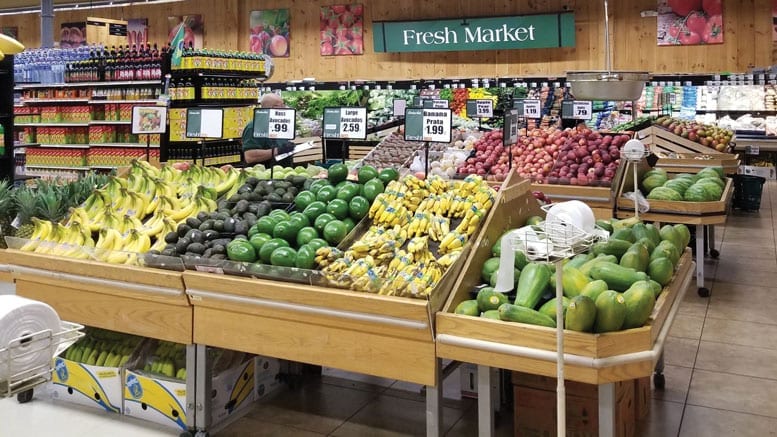Seabra Foods Supermarket
March 1, 2019 | 4 min to read
In South Florida, Seabra Foods Supermarket thrives by catering to the area's significant Hispanic population, which includes 30% in Broward County and 22% in Palm Beach County. General manager Filipe Silva emphasizes the importance of offering culturally relevant foods like rice, beans, and tropical fruits such as mangos and bananas. Their produce department showcases a vibrant selection to attract diverse shoppers, blending conventional items with exotic offerings that appeal to various ethnicities.

Originally printed in the February 2020 issue of Produce Business.
Catering to South Florida’s large Hispanic population.
As a result of its highly diverse demographics, South Florida retail supermarkets experience a wealth of opportunities to market produce.
Seabra Foods Supermarket is a leading U.S. ethnic food retailer and operates two of its 16 stores in South Florida. The Newark, NJ-based chain, which began operations in 1972 in the Northeast, expanded to Florida in 2004 when it opened a store in Deerfield Beach. Since then, it moved to Orlando, in 2017, and started another South Florida location in Parkland, in July 2019.
The Parkland store is on the northeast side of the city, about 15 minutes northwest of the Deerfield Beach store. The Deerfield Beach store is across from the Pompano Beach city limits and north of Fort Lauderdale. The whole South Florida region, from Florida City on the south to West Palm Beach and points farther north, is very ethnically diverse.
In Broward and Palm Beach counties, which the stores serve, 30% of Broward’s residents are listed as Hispanic, according to Broward County’s website, www.broward.org, while in Palm Beach County, the rate is 22%, according to Palm Beach Multicultural Business News’ website, palmbeachmulticulturalbusinessnews.com. While the Hispanic population in other areas such as Miami, Orlando and Tampa originate mostly from Caribbean countries such as Puerto Rico, Cuba and the Dominican Republic, in Palm Beach County, the Caribbean represents 34% of the Hispanic population, with Central America at 45% and South America at 20%, according to the report.
“South Florida is a melting pot of ethnic cultures,” says Filipe Silva, Seabra’s general manager. “These cultures bring a bit of their countries. They have the little feeling about their culture — what they’re use to eating. When someone comes here at 35-40 years old, it’s hard from them to break away from that. They’d rather have rice and beans or yucca than pizza.”


Seabra’s Deerfield Beach store focuses on middle class Brazilians. The stores also specialize in supplying international foods from Latin American countries and Spain, which constitutes about half of the store’s shoppers. This makes South Florida ideal for a Hispanic-focused chain.
“We have to cater to the clientele,” says Silva. “We know what kind of people are in our regions, and we must make the aisles appeal to their cultures. We open them up on Brazilian and Asian products, which are all very different.”
The focus fits well with the region’s most common foreign languages spoken — Spanish, Haitian and Portuguese, according to Denver-based Data Incorporated.
At the Deerfield Beach store, produce accounts for 5,000 square feet of the store’s 20,000 square feet. In the produce department, 500 stock-keeping units are merchandised.
“Produce is the power aisle,” says Silva. “When you walk in, you have to say ‘wow, I like this.’ The produce department opens your eyes to freshness. If a customer walks in and everything looks wilted, it doesn’t do anything for the customers. But when you walk in and see fresh mangos jumping at you, as well as avocados and citrus, all the colors of produce, it just grabs you.”
The region’s Portuguese population also shops in the area. Some come from as far north as Palm Coast, FL, south of Jacksonville, and 251 miles away from the Deerfield Beach store. Over the years the clientele has changed. Those shoppers now drive to the closer Orlando store, which is also successful.
Popular items include tropicals and roots. Mangos and bananas, including yellow and green bananas and plantains, are big sellers at the South Florida stores. Sweetness rules as Hispanics enjoy sweet fruit, notes Silva.
“It’s almost like entertaining different cultures,” says Silva. “You entertain them with different foods. You don’t have music, you have food. A majority of people want to try something different.”
Seabra attempts to serve a different niche than the large national chains and smaller independents, which do business in the region. The store sells conventional produce such as apples, pears, sweet corn, tomatoes and citrus but features many exotics, which many white Americans find they enjoy eating, says Silva. “Produce is conventional. It’s for everyone,” he says.
“While many Americans don’t know what yucca is or wouldn’t try green bananas, they would enjoy eating them on our hot table. They’re big items for us. At our store, they will see these items, which are new to them. They will want to try them.”
FACT FILE:
Seabra Foods Supermarket
839 W Sample Rd
Pompano Beach, FL
P: (954) 783-9895
7671 N State Road 7
Parkland, FL
P: (754) 201-2706
www.seabrasmarket.com
16 of 16 article in Produce Business February 2020

